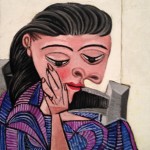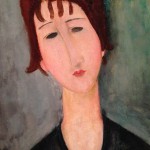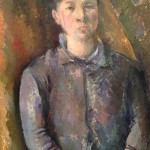Network Detroit and Great Lakes THATCamp
Posted on October 5, 2013 in Uncategorized by Eric Lease Morgan
This time last week I was in Detroit (Michigan) where I attended Network Detroit and the Great Lakes THATCamp. This is the briefest of postings describing my experiences.
- Picasso
- Modigliani
- Cézanne
Network Detroit brought together experienced and fledgling digital humanists from around the region. There were presentations by local libraries, archives, and museums. There were also presentations by scholars and researchers. People were creating websites, doing bits of text mining, and trying to figure out how to improve upon the scholarly communications process. A few useful quotes included:
- Design is a communication of knowledge. —Rebecca Tegtmeyer
- Stop calling it DH… Show how DH supports the liberal arts… Build a support model… Integrate DH into the curriculum. —William Pannapacker
- Analytic brillance is no longer the only game in town. —Lior Shamir
- Provenance verification, knowledge representation, and staffing are the particular challenges when it come to making archival material accessible. —Arjun Sabharwal
- Commenting should be a part of any museum’s website. —Adrienne Aluzzo
Day #2 consisted of participation in the Great Lakes THATCamp. I spend the time doing three things. First, I spent time thinking about a program I’m writing called PDF2TXT or maybe “Distant Reader”. The original purpose of the program is/was to simply extract the text from a PDF document. Since then it has succumbed to creeping featuritis to include the reporting of things like: readability scores, rudimentary word clouds of uni- and bi-grams, an extraction of the most frequent verb lemmings and the listing of sentences where they are found, a concordance, and the beginnings of network diagram illustrating what words are used “in the same breath” as other words. The purpose of the program is two-fold: to allow the reader to get more out of their text(s), and 2) to advertise some of the services of the Libraries’s fledgling Center For Digital Scholarship. I presented a “geek short” on the application.
The second and third ways I spent my time were in group sessions. One was on the intersection of digital humanities and the scholarly communications process. The second was on getting digital humanities projects off the ground. In both cases folks discussed ways to promote library services, and it felt as if we were all looking for new ways to be relevant compared to fifty years ago when the great libraries were defined by the sizes of their collections.
I’m glad I attended the meetings. The venue — Lawrence Technical University — is a small but growing institution. Detroit is a city of big road and big cars. The Detroit Art Institute was well-worth the $8 admission fee, even if you do get a $30 parking ticket.









